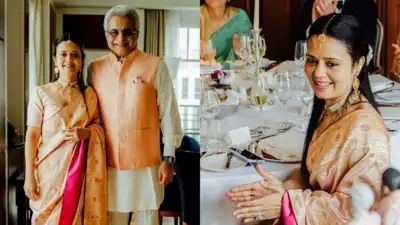ARTICLE AD BOX

A few weeks ago, news surfaced of TMC MP Mahua Moitra marrying Pinaki Misra, a former BJD MP, in an intimate ceremony in Berlin on May 30. With both being significantly older – Moitra is 50 while her husband is 65 - by societal standards to walk down the aisle and that too for the second time in their respective lives, the news naturally garnered public attention.
But this evolving narrative is not just limited to the elites, highlighting that love and companionship are universal desires, regardless of age or social status. Across Odisha and elsewhere in the country, more and more individuals, like divorcees, widowers and those who didn’t marry in their youth, are finding love later in life.Sociologists opined that following the loss of a spouse or divorce, many seniors are actively seeking companionship, valuing the emotional support and shared experiences that come with partnership.
Improved healthcare and longer life expectancies, besides changing social attitudes, have made it more acceptable for older adults to pursue new relationships.Shukadeba Naik, a retired professor of sociology of Sambalpur University, said that while remarriages in older age groups are more common among the elite, the desire for companionship transcends social classes. “Late marriages are often about seeking partners with whom one is compatible.
Arranged marriages used to be family-to-family relations, which meant fewer breakdowns, but now it's more individualistic and people are more open to finding new partners when relationships don't work out,” he added.Take for example Shankar Sahoo, a 53-year-old employee of Rourkela Steel Plant. In 1999, Shankar married a woman, who was also a working professional, and had two daughters with her. But four years into the marriage, the couple’s relationship was on the rocks and they eventually divorced in 2015.
The separation agreement stipulated that Shankar would bear the educational and wedding expenses of his daughters, who stayed with their mother. Despite the emotional toll of the divorce, Shankar found solace in the support of his parents, who lived with him -- and in the company of a woman 18 years his junior whom he is now married to and who is the mother of his nine-year-old son. “After the divorce, I had decided not to marry again due to the trauma I experienced,” Shankar said.
But his family encouraged him to consider remarrying. Today, he has a blended family that includes his daughters as well.
“My wife has brought happiness and peace not only to me but to my entire family as she accepted my daughters whole-heartedly,” Shankar said.Similarly, a businesswoman, who lost her husband to dengue shortly after the birth of her daughter in 2010, gave marriage a second chance when she lost her father.
“My father was a huge support system after my first husband’s passing. It was him who helped me take over my late husband's business and he raised my daughter as well. After my father’s passing, I felt a void, which is when my family encouraged me to consider marrying again,” she said. And in 2017, through an arranged marriage set up, she exchanged vows with a man who had also lost his spouse and had a daughter as well. “I never thought I would marry again, but it was in my destiny,” she said, adding, “After my second marriage, my daughter and I found a new home and happiness.”Naik added that with both men and women becoming career-oriented, the average age of marriage is getting delayed for the middle class as people, who don’t want to get married until they become financially independent or achieve something.Rabi Behera, a social activist from Jagatsinghpur, married just months shy of his 50th birthday. Behera's journey to matrimony was not a conventional one. Engrossed in his passion for social activism, the thought of marriage took a backseat.
It wasn't until he met his current wife, Sujata Barik, at a workshop that the idea of marriage became a reality. Both Behera and Barik, a fellow social activist from Kendrapada, found common ground in their dedication to social justice and soon, they became romantically involved.
"Social justice was a common issue we both worked for and we got attracted to each other and got married,” Behera added.Barik echoed similar sentiments, having initially decided against marriage. "I had kind of decided that I won’t get married. But when he proposed, I decided to take the plunge," she said. Today, the couple resides in Bhubaneswar and is raising their seven-year-old daughter, balancing their family life with their ongoing commitment to social causes.Anup Dash, a retired professor of Utkal University, said, " With rising cases of divorces, many are looking to remarry and age is no longer a barrier as people seek companionship and compatible partners."



.png)
.png)
.png)
















 14 hours ago
5
14 hours ago
5









 English (US) ·
English (US) ·